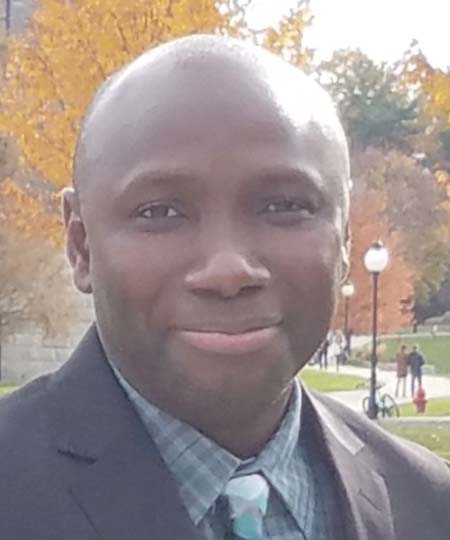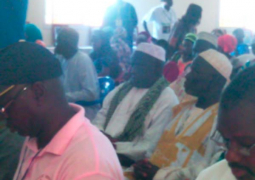
by
Sankung Papa Susso, EdD. Professor of Education Touro College and University
System Email: sankung.susso@touro.edu
While
change is inevitable, it is a phenomenon that does not come easily. Change
agents are often optimistic in public. However, they are privately cautious
about the end they seek. An example of such cautious optimism could be traced
to the civil rights era in the United States.
By
the 1960’s, many in the United States wanted to see a different direction in
the nation’s social and political engagement. That is because since the passage
of the Emancipation Proclamation in 1865, many southern states that fought to
keep slavery alive, resorted to the use of statutory construction after their
loss during the civil war. They constructed state statutes that served as
structural barriers in an effort to undermine the intent of the Thirteenth
Amendment to the United States Constitution.
Their result was a lack of
opportunity for the newly freed slaves, especially those in the south.
Employment was restricted to whites, as were voting rights, civic
participation, education, and property ownership. Black people in the south
became confined to their continued dependence on whites. Black women were
employed as maids, while men worked as street cleaners and laborers. Black
children attended makeshift schools that were characterized by overcrowding and
lack of resources. Altogether, while the northern states won the battle to free
slaves, the south won the war on instituting poverty within the black
community. It is an experience that continues to haunt minority communities in
the United States to date.
The
1960’s became the era of rebellion. The likes of Dr. Martin Luther King, Jr.
saw unevenness in the application of justice and decided to alter history.
Fortunately, many civic minded people also had enough with oppression.
Americans sought change in various facets of society. The women’s rights
movement, disability rights advocates, and civil rights pioneers all fought
alongside each other to rewrite the course of American history. They fought to
hold government accountable to the people by ensuring that the promise of a
classless society that democracy and the rule of law promised, were no longer
ignored.
Citizens
who no longer trusted their government or the people who ran it, took a stand
against segregation, disenfranchisement, economic oppression, and the passive
acknowledgement of freedom and equality. In his letter from the Birmingham
jail, Martin Luther King, Jr. wrote, “As in so many past experiences, our hopes
had been blasted, and the shadow of deep disappointment settled upon us. We had
no alternative except to prepare for direct action, whereby we would present
our very bodies as a means of laying our case before the conscience of the
local and the national community.” Dr. King and his apostles fought for the
right of every citizen. They envisioned a world in which people of diverse
backgrounds and beliefs could come together to create a community of equals.
They
fought for human and civil right because such rights have been the ambition of
cultures and people for thousands of years. Civilizations fought for freedom in
order to break away from social hierarchies that concentrated power atop, while
keeping the masses under subjugated conditions. While under servitude, slaves
built monuments, canals, statues, cultural institutions, and social
infrastructures. While their work kept their oppressors in power with
privilege, their perceived social status kept them inferior. Even after their
emancipation, blacks in America had to fight for basic rights such as
citizenship. As citizens, additional struggles belied them. Blacks in America
fought for the right to an education, the right for equal employment, the right
to be recognized as equal members of society, and the right to participate in
public service. Such inferiority complex is what continues to drive generations
of underserved groups across the globe to a call for freedom.
Freedom is immaterial. Whether it
was in Ancient Greece, Egypt, Rome, the trans-Atlantic or Saharan slave trades,
freedom is a unifying force that transcended culture, language, and religion.
To benefit from its reigns, diverse groups of people overcame their differences
and fought in unison. They fought hand-in-hand because of their collective
thirst for hope. Their sacrifices paved the way for a future in which their
posterity would be afforded opportunities they were denied. With hope and
dream, the oppressed fought and successfully overcame social, political, and
economic barriers.
The
genesis of a commitment to oneness is essential to overcoming obstacles. We are
one when we share a commitment to unity. Whether it is in our words or our
deeds, the human faculty is too great to be rendered futile. Democratic
principles appropriately condoned open dialogue for the purpose of sharing
ideas to enhance the human experience. Open exchanges of thoughts are essential
components in a participatory democracy. When people are free, they should be
able to exercise their civic duties unencumbered. We do not have to agree all
the time. However, we have to be open to diverse opinions. Diversity can become
uncomfortable. However, exclusionary alternatives are far too grave.
This article envisions a declaration
in support of freedom of thought and expression. It is also an ode to the
nation’s youth and underrepresented groups. In particular, it is aimed at
projecting a campaign of tolerance amid tension. The voices of reason would
argue for a liberal process in which the voices of decent are unrestricted.
The work to rebuild The Gambia
continues to be inspiring. There is a new government with patriotic citizens
who are willing to put partisan politics aside in the national interest. It is
my belief that every Gambian owes the new leadership an open mind. I remember
in the United States when Barack Obama was first elected as president. There
were widespread views that with a promise of hope and change, poverty will be
eliminated and the culture of racism will disappear. However, the opposite is
true.
By
the time President Obama left office, poverty in minority neighborhoods
remained dense, racism became illuminated, and the country became more polarized
than ever. However, those failures cannot be attributed to Mr. Obama. As a
nation, every citizen has a role to play in national development. People lost
sight of that vision in the United States. Instead, they convinced themselves
of an illusion that government could solve all of their problems. Such a
mindset is a fallacy. Governments are supposed to help enhance the quality of
life for every citizen. How such transformations manifest themselves will
depend upon the individual contributions of each citizen.
As
the parliamentary campaign is underway, it is baffling to see the lack of youth
participation in the process. Sure, there are a lot of people out in the
streets, dancing, singing, and chanting for their preferred candidates. Such
activism should be commended. However, I would like to task The Gambia’s youth
to work towards public service. Today, there is an effort to lift the age limit
to serve in certain governmental positions, namely the presidency and vice
presidency. I believe that is a commendable approach because an unjust law is
no law at all. I equally believe that efforts should be made to include more of
the nation’s youth in higher positions within the public service so as to offer
the youth opportunities to become future leaders of The Gambia. If the nation’s
youth remains unprepared for the task of governing, it will be hard to imagine
the future leaders of the country.
I
remember back in the early 1990’s when then President Jawara announced his
intension to retire. Many in the country welcomed his announcement, even if
they would not say it publicly. However, many more citizens felt at a
standstill. They were shocked because they could not imagine anyone else
running The Gambia at the time.
We
were used to the same president and the same government so much that a
transition was unimaginable. Because we were unprepared for change, it came as
a shock on July 22, 1994 when a coup was successfully staged, leading the
country into autocracy. We should learn from history and make the changes necessary
today in order to be ready for tomorrow.
The
nation’s youth are indispensable. Today, Gambians are taking the so-called
backway because of a perceived lack of opportunity at home. Recently, a few
hundred were sent home because of restrictions in countries that are willing to
accept them as migrants and refugees.
However, security conditions are making it
difficult for most countries to accept refugees. In countries such as South
Africa, migrants have now become targets for violence and other atrocities
because of a perceived lack of opportunities for its citizens. A lot of these
kinds of frictions can be resolved by creating opportunities for increased
youth employment. Educational incentives will also help prepare many of the
nation’s youth for public service should they choose to do so. This is what I
believe the current parliamentary election should be about. It is a view that I
share and hope that in support of our nation’s youth.


